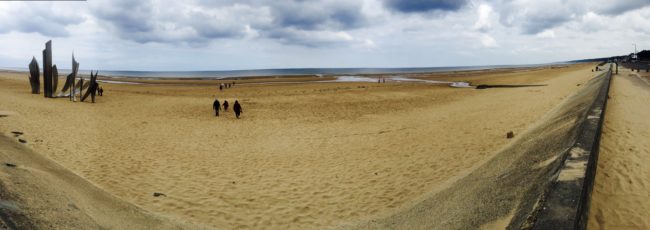Class Spotlight: World War II
Last summer in London, I took a Vanderbilt Maymester class called The Economics of Warfare. We talked a lot about World War II, and actually got to visit major war sites such as D-Day beaches in Normandy (pictured below) as well as Churchill’s War Rooms in London. After visiting such historic locations and learning about the economics behind military strategy, I realized how little I knew about World War II, and simply watching war films such as Saving Private Ryan wasn’t going to be enough. So I decided to take a history class called World War II, which is being taught by Professor Michael Bess this semester. It is by far the *best* class I’ve taken this semester, and one of my top 5 classes of all time.

Although we talk a lot about military strategy, troop movements, and famous leaders and battles, Professor Bess enhances his class by focussing on aspects of the war that often get eclipsed. For example, did you know that the Battle of Kursk was one of the most terrifying battles ever fought in the war, and in many historians’ eyes, the definitive battle of World War II? Or that Knut Haukelid, a Norwegian resistance leader, played an important role in thwarting Germany’s nuclear efforts? It’s been very rewarding for me to get to learn about events and people who have had a such major role in shaping history, but often don’t get their due.
One of my major takeaways from this class has been learning that World War II is a morally complex war, much more than popular narratives and Hollywood films suggest. While Professor Bess makes sure he tells us about the specifics of the different theaters of the war, he likes to focus more on the moral choices made by people, not just by leaders such as Churchill and Stalin, but also by soldiers on the ground and on battleships. During the war, Professor Bess’ grandfather was a fascist mayor of an Italian town while his mother was the member of the resistance, and it is so much fun hearing about his personal perspectives of the war!
College campuses and even Facebook newsfeeds can devolve into echo chambers, but this class does a great job of putting students like me in the “other” side’s shoes. For an essay assignment, we read and analyzed Requiem for Battleship Yamato, an autobiographical account of Yoshida Mitsuru, a Japanese kamikaze naval officer fighting American forces. We also read about how colonial forces in 19th century-Japan exacerbated its problematic nationalism, which manifested itself in the Pearl Harbor attack. It can be uncomfortable to read about history in a way that challenges or even completely contradicts your preexisting notions, but isn’t that what college is for? To get out of your comfort zone?
For another essay, we had to interview someone who has lived through the war. I interviewed Professor Vereen Bell, whose father was killed in the Battle of Leyte Gulf, about his experiences growing up during World War II. Professor Bell is such an amazing storyteller, and I have learned so much from his vivid memories and unique insights. This was my first time interviewing someone who’s lived during the war, and it was especially fun because I love getting to know professors beyond the classroom!
I cannot wait to see how this class unfolds for the rest of the semester, but if you ever have the opportunity to take World War II (or any other class) with Professor Bess, I highly recommend doing so!